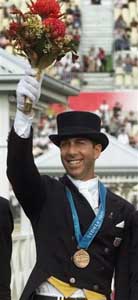-
- Personally and professionally, gay governor has uphill fight
- In Utah, same-sex marriage amendment hits unexpected bump
- Legal battle continues over Louisiana same-sex marriage ban amendment
- Judge denies relief to out-of-state same-sex couples
- People of faith ask: How would Jesus vote?
- Openly gay man appointed judge in busy Detroit court
- National News Briefs
- World News Briefs
health & sports
Out at the games – Where are the gay Olympians?
Nine openly gay athletes and counting in Athens
Published Thursday, 26-Aug-2004 in issue 870
ATHENS (AP) – U.S. equestrian Robert Dover is among the rarest of all 10,500 athletes in Athens, not only for his six Olympic appearances but because he is one of a tiny handful of competitors who is openly gay. Dover – along with some prominent ex-Olympians who came out after retiring – believe there are scores of other GLBT athletes in an array of sports at these Summer Games, either fully in the closet or confiding only to a small circle of people.
Same-sex couples may be able to marry in a few European countries, and now Massachusetts, but it’s another era on the Olympic field of play.
OutSports.com, a website devoted to gay sports, tried to tally the number of openly gay and lesbian athletes competing in Athens and came up with only seven – including Dover, Guenter Seidel (also on the American equestrian team) and British Equestrian Team member Carl Hester, tennis players Martina Navratilova and Amelie Mauresmo, Dutch swimmer Johan Kenkhuis, German cyclist Judith Arndt and female German fencer Imke Duplitzer. Dover suggests there are scores more not ready to be open.
Dover, a three-time bronze medallist who is captain of the dressage team that competes in the equestrian events, said many GLBT athletes simply want to stay focused on their performance and worry that publicizing their sexual orientation could lead to distractions.
“But there also are many athletes afraid to come out because of their peers, or their coaches or their loved ones having negative feelings,” Dover said. “We have to keep on showing the world that – just like straight people – we’re going about our lives, doing the very best we can to make our country and our families proud.”
Mark Tewksbury, who came out six years after winning a gold medal for Canada in the backstroke in 1992, says Dover is lucky to compete in a sport considered unusually accepting of gays and lesbians.
Swimming – like most other Olympic sports – is different, Tewksbury said. He recalled his anguish at lacking the nerve to object, and reveal his sexual orientation, when teammates used “fag” as their insult of choice.
“I got so tired of lying, of living a double life, I felt like I was going to die,” said Tewksbury, 36, who is in Athens covering the Olympics for the Canadian Broadcasting Corp. “I was afraid of being beaten up, afraid my coach would stop coaching me, afraid my teammates would reject me.”
Tewksbury has become an activist, campaigning for athletes’ rights in general and specifically promoting programs – such as the 2006 OutGames in Montreal – to encourage GLBT athletes.
Among his occasional colleagues is Holly Metcalf, a gold-medallist U.S. rower in 1984. Metcalf, 46, lives near Boston with her 4-year-old daughter and her partner of nine years, whom she plans to wed now that Massachusetts recognizes same-sex marriages.
Metcalf said it is unfortunate, though understandable, that so many GLBT Olympians are reluctant to come out.
“It often comes down to financial considerations,” she said. “You’ve got so many women moving into collegiate sports, with a lot more money there now, and you have lesbian coaches who think, ‘Oh, my God, if anybody finds out, I’ll get fired.’ Colleges don’t want to deal with this.”
Through it all, many GLBT Olympians remain cautious – most won’t come out until there are GLBT gold medallists saying, “Hey, don’t be afraid,” Metcalf said.
A common pattern for GLBT Olympians is to come out after retirement – four-time diving gold medallist Greg Louganis is an example. He revealed in 1994 that he was gay and HIV positive, and later wrote a candid autobiography.
“You spend a day with these athletes, and it becomes obvious that gay people are everywhere,” Dover said. “The reason many of them aren’t out is because they’re focused on their job during this time when sports is the No. 1 thing in their lives.”
Dover, 48, kept mostly quiet about his sexuality until 1988, when he met fellow rider Robert Ross, his partner ever since. Dover manages a stable near his home in Lebanon, N.J., spends winters in Wellington, Fla. – a riding mecca near Palm Beach – and oversees a foundation which assists people in the horse world who have HIV or AIDS.
While Tewksbury believes full acceptance of GLBT Olympians may take many years, Dover is heartened by ongoing changes. He cited an appearance by the five gay stars of the hit TV show “Queer Eye For The Straight Guy” in a film shown to American athletes by the U.S. Olympic Committee to help them prepare for Athens.
“It’s proof that things are moving along,” Dover said.
|
|
Copyright © 2003-2025 Uptown Publications


